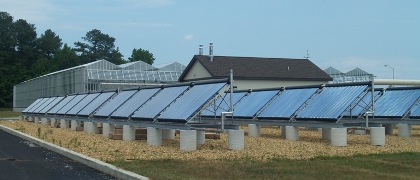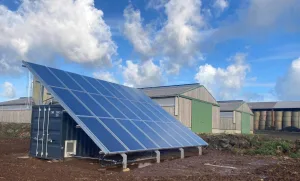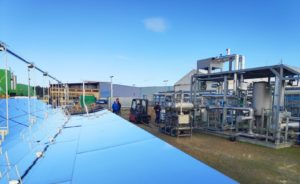USA: Solar Energy Dries Biosolids in Wastewater Treatment Facility
December 6, 2011
 As part of its plan to reduce the dependence on fossil fuels, the Kent County Regional Wastewater Treatment Facility in Milford (Delaware), USA, has been using solar energy from a vacuum tube collector field with 317 m2 of gross area for its biosolid drying process since August 2011. The collector field with 66 panels of type SPP-30A was delivered by US-American company Solar Panels Plus. The panels supply the energy for a radiant floor system, which heats the concrete floor of three greenhouses measuring 240 by 80 feet.
As part of its plan to reduce the dependence on fossil fuels, the Kent County Regional Wastewater Treatment Facility in Milford (Delaware), USA, has been using solar energy from a vacuum tube collector field with 317 m2 of gross area for its biosolid drying process since August 2011. The collector field with 66 panels of type SPP-30A was delivered by US-American company Solar Panels Plus. The panels supply the energy for a radiant floor system, which heats the concrete floor of three greenhouses measuring 240 by 80 feet.
Photo: Jim Newton / Kent Country Regional Wastewater Treatment Facility
According to a press release sent out by Solar Panels Plus in November 2011, the “combination of the solar thermal heat and the passive solar capability of the greenhouses provides 40 to 50 % of the heat needed to dry the biosolids”. A natural gas-fired heating system supplies additional heat when needed.
The Kent County Regional Wastewater Treatment Facility (KCRWTF) invested about USD 3.9 million in Milford, of which USD 3 million were spent for the greenhouses and around USD 900,000 for the radiant floor heating, the solar system and the two back-up boilers.
The public institution did not receive any investment subsidies, but profited from a federally funded low-interest loan with 2 %. Still, this means that with around 15 years, the payback time of the total investment is fairly high. “However, the project driver was promoting the facility’s sustainability programme and reducing the dependency on natural gas,” Jim Newton, Environmental Programme Manager of KCRWTF, explains. Newton estimates the cost-saving effect of the solar active and passive systems to be USD 17,000 in a four to five-week cycle, which adds up to annual savings of around USD 176,800.
In addition to the solar-powered biosolid dryers, KCRWTF has also implemented other innovative technologies, such as a 1.2 MWp photovoltaic solar farm and an ultraviolet disinfection system instead of chlorine gas. These environmental measures have not gone unnoticed. “Earlier this year, the Environmental Protection Agency Region III awarded its annual Pisces Award to KCRWTF for its extensive environmentally friendly changes,” states the press release of solar Panels Plus.
The Milford project is a pilot project, as KCRWTF knows it needs more biosolid dryers in the coming years. Their end product is used by farmers to amend soil, by a local landfill as a daily cover or by a local cement kiln as a fuel supplement to coal.
More information:
http://www.solarpanelsplus.com
Kent County Regional Wastewater Treatment Facility


